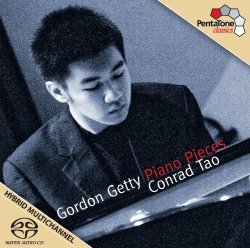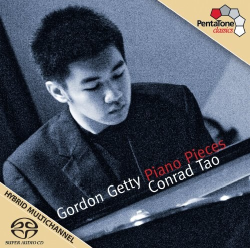
Gordon Getty is a major musical philanthropist in the Bay Area, and a composer as well. His PentaTone SACD release will be of value to those who appreciate terse, melodic, and simplistic piano music that at times evinces a subtle sophistication. The 23 tracks on the CD, half of which last less than two minutes each, consist of three suites and four individual numbers.
The Ancestor Suite is the longest set on the release at 10 tracks. The program notes, even more abbreviated than the music, relate nothing about this composition or its title. However, a search on the Internet reveals that the music was composed for a ballet on Poe’s Fall of the House of Usher. Perhaps the story appealed to Getty because in it, the ancestors of Roderick Usher had been noted for “repeated deeds of munificent yet unobtrusive charity” as well as a “passionate devotion to the intricacies … of musical science.” In any case, the dances of the suite are far lighter entertainment than the tone of the Poe. Most of them are in an obvious ABA form; some are two or three ABA dances strung together. Many are given central European titles (Zwei Walzer, Schottische, Ewig Du). Chords are uncommon; linearity is emphasized in a predominate two-part harmonic texture. Some numbers display a child-like naiveté; others move briefly into more mysterious realms. My favorite of the bunch is “Waltz of the Ancestors,” which you can hear in the excerpt from the CD.
The Three Traditional Pieces are the most attractive numbers on the CD. “The Fiddler of Ballykeel” features a melody with a nice Scotch twang. While the title of “Tiefer und Tiefer” (deeper and deeper) doesn’t make sense to me, in the absence of a booklet explanation, it is a pleasant waltz. Unlike most of the other music on the CD, “Ehemals,” (German for “formerly” — why?) offers a few technical challenges for the pianist, has a more complex form, and toys with a paraphrase from the third movement of Beethoven’s “Emperor” concerto.
Two of the four individual pieces are light and brief, one referencing a phrase from the “Irish Washerwoman” jig. The last two, Andantino and Scherzo Pensieroso, are the most recently composed. Contrary to Getty’s assertion that they “might easily” have been composed in 1962, the year of the CD’s Homework Suite, a collection of pieces written when he was a San Francisco Conservatory student, they display far more melodic and harmonic variety, and a more malleable rendering of materials. Whether he admits it or not, Getty has matured over the years, and for the better.
Pianist Conrad Tao rightly takes Getty’s pieces on with a minimum of flamboyance, emphasizing clarity and linearity. A couple of the endings sound a bit too abrupt for my taste; perhaps a greater ritard may have been in order. But other than that, his work is flawless, deserving of Getty’s accolade to him: “Everything came out as I had imagined it.”



